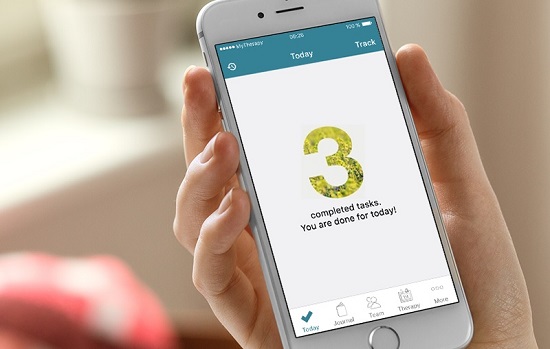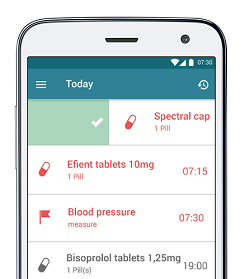If You Have Coronary Heart Disease, You Can Reduce the Risk of Having a Heart Attack with a Medication and Health Tracker App
Prevention Is Always Better Than Cure. Reduce the Risks of Coronary Heart Disease by Using MyTherapy to Help You Implement Important Lifestyle and Medical Changes

A heart attack - also known as a myocardial infarction - occurs when the flow of oxygenated blood to a section of the heart muscle becomes blocked and the heart therefore doesn’t get enough oxygen. If the blood flow isn’t restored quickly enough, the heart muscle begins to die. Heart attacks therefore need to be treated as a serious medical emergency. Patients, who are at increased risk of having a heart attack or have made a successful recovery from heart attacks, need to make several changes to prevent future ones from happening. These include lifestyle changes (such as stopping smoking and exercising regularly) and taking several medications (such as ACE inhibitors, beta blockers, or anticoagulants). It is not always easy to implement these changes, especially when you haven’t had to take medication regularly before or have formed daily habits (like smoking). Fortunately, there are smartphone health apps that can help you make these important, life-saving changes.
MyTherapy, one of Europe’s leading medication management apps, was specifically designed to help patients prevent medical emergencies, such as strokes and heart attacks. If you are at risk of having a heart attack due to coronary heart disease (CHD) or high cholesterol, then you should consider using MyTherapy to encourage you to take take your medication, implement lifestyle changes, and keep an eye on your overall health.
So, how does it work?
MyTherapy’s primary function is to remind you to take your medication at the correct time and dose each day by generating reminders in the form of an alarm and pop-up notification. The app will continue to remind you to take your medication until you have done so by clicking on the confirm button. You can also use this reminder feature for doctors’ appointments and to help you engage in regular physical activity. The app also comes with a digital health diary that allows you to track your health in terms of symptoms, medication side-effects, and measurements (like blood pressure, weight etc.). You can also record any important lab results. Importantly, you can print out all the data you have recorded in the app in the form of a monthly health report generated by the app. This health report (in the form of easy-to-read graphs) can be shared with your doctor, thereby ensuring that you and doctor can work closely together to track your health and find out if your treatment plan needs to change. You can also set daily health goals, which can include anything from physiotherapy to eating healthily.
The team at MyTherapy takes user feedback seriously, meaning that we are consistently updating the app to make it better for you. It is easy to use and can be downloaded for free. You also don’t need to worry about your data, as it is protected by strict German privacy laws. The app is highly recommended and is proven to increase medication adherence rates, thereby ensuring that you stay on top of your health.
Coronary Heart Disease: Things You Should Know
A heart attack occurs when the blood supply to the heart muscle is cut off. It is also known as a myocardial infarction (MI) and is a serious medical emergency that requires immediate treatment. As we age, a substance called plaque (mainly made up of fat and cholesterol) builds up in the arteries, causing them to become narrower via a process known as atherosclerosis. Eventually, an area of plaque can rupture inside of an artery and cause a blood clot to form on the plaque’s surface. If the clot is large enough, it can block blood flow through a coronary artery, starving the heart muscle from essential oxygen and nutrients. As a result, heart cells become damaged and die off and patients experience a heart attack. This can lead to serious complications directly after the heart attack, such as an abnormal heartbeat (arrhythmia), a cardiogenic shock, or heart rupture.
Heart attacks most often occur as a result of coronary heart disease (where plaque builds up in the coronary arteries). A less common cause of a heart attack is when there is a severe spasm of a coronary artery. Spasms can occur in coronary arteries even if they aren’t affected by atherosclerosis. In general, about one third of people who have a heart attack will die from the complications. If people survive for more than 28 days after the heart attack, their outlook dramatically improves and they may live for many more years. An estimated (link:http://www.who.int/news-room/fact-sheets/detail/cardiovascular-diseases-(cvds text:17,7 million people died popup:yes rel:nofollow) from cardiovascular diseases in 2015. Of these deaths, about 7,4 million were caused by coronary heart disease.
A Combination of Symptoms to Look out for
Some of the most common warning signs of a heart attack in both men and women include:
- Chest pain or discomfort in the center or left side of the chest
- Tightness in the chest, which can feel like pressure, squeezing, heartburn, or indigestion
- Upper body discomfort (pain in one or both arms, the back, shoulders, neck, jaw, or upper part of the stomach)
- Fatigue or feeling tired for no reason, sometimes for days
- Difficulties with breathing
- Feeling light-headed
- An overwhelming feeling of anxiety
- Cold sweat
- Nausea and vomiting
It is important to note that not everyone will experience these symptoms and symptoms vary from person to person. For example, the pain may only be mild and misinterpreted as indigestion. Therefore, it is mainly the overall pattern of symptoms that determines whether someone is experiencing a heart attack. If you or anyone else has these symptoms, you need to call an ambulance immediately. The doctor will diagnose a heart attack by evaluating your symptoms and medical history and by performing an electrocardiogram (ECG). An ECG measures the electrical activity of the heart. It is likely that your doctor will also perform blood tests to check whether there are any proteins in your blood that indicate heart muscle damage. Further tests may be necessary to determine the exact location of the blockage or narrowing of your arteries. After a heart attack, you will receive emergency treatment in hospital to help reduce the damage to your heart and to prevent future complications. For example, you may have procedures such as an angioplasty and stent implantation or a bypass surgery.
The Risk Factors for Developing CHD
As mentioned above, coronary heart disease is the most common cause of heart attacks and there are several risk factors that increase your chances of CHD. These include:
- Smoking
- Being overweight or obese
- Having high blood pressure (hypertension)
- Having a high level of cholesterol
- Having diabetes
- A diet that is high in saturated fat
- Lack of exercise
- Excessive alcohol consumption
- Having a family history of coronary heart disease
- Age (the risk increases for men after the age of 45 and after the age of 55 in women)
- Preeclampsia, where there is a rise in blood pressure and excess protein in the urine
- Stress
- Having an autoimmune condition
Some of these risk factors occur together (like obesity, hypertension, and high blood sugar) and when they do, it’s referred to as metabolic syndrome. In general, a person with metabolic syndrome is twice as likely to develop heart disease and five times as likely to develop diabetes.
How to Prevent Future Heart Attacks
Whether you are at risk of having a heart attack or have already had one, it is essential to make several lifestyle changes to prevent future heart attacks from occurring. You will need to make lifestyle changes, such as stopping smoking, eating a healthy and balanced diet, and exercising regularly. You will also be advised to take certain medications to lower the risk of heart attacks. These include:
- Angiotensin-converting enzyme (ACE) inhibitors. These drugs prevent the hormone angiotensin from constricting blood vessels. The blood can therefore move with ease through the enlarged blood vessels. Examples of ACE inhibitors include lisinopril (Zestril), benazepril (Lotensin), and captopril (Capoten).
- Angiotensin-II receptor blockers (ARBs). These drugs completely block the effect of the hormone angiotensin II on the heart. They are recommended if ACE inhibitors cause problematic side effects. ARBs include candesartan (Atacand) and losartan (Cozaar).
- Calcium channel blockers. These drugs reduce the rate at which calcium triggers heart contractions and reduce the blood pressure. Calcium channel blockers include amlodipine (Norvasc) and diltiazem (Cardizem, Tiazac).
- Anticoagulants. These drugs are sometimes called ‘blood thinners’, although they do not actually thin the blood. Instead, they prevent new blood clots from forming. Anticoagulants include heparin (various) and warfarin (Coumadin).
- Beta-blockers. These drugs control the heart rate and prevent it from beating too fast, thereby lowering high blood pressure. Common beta-blockers include acebutolol (Sectral) and atenolol (Tenormin).
- Cholesterol-lowering medications. By lowering your cholesterol, you will have less plaque build-up. Examples of cholesterol-lowering medicines include statins, nicotinic acids, and cholesterol absorption inhibitors.
- Anti-platelet agents. These drugs prevent blood platelets from sticking together, thereby preventing blood clots from forming. Anti-platelet agents include aspirin, clopidogrel (Plavix), and prasugrel (Effient).
If you think you or someone might be having a heart attack, you must act immediately. Call emergency services and take aspirin in the interim, as it can help keep your blood from clotting.
Healthy Hearts with MyTherapy
Heart attacks are medical emergencies from which many patients do not recover. Therefore, it is imperative to take as many precautions as possible to prevent heart attacks from happening. MyTherapy can offer you the valuable support you need to lower your chances of having a heart attack. With its reminder function and built-in health diary, MyTherapy encourages you to track your health consistently and create a structured daily routine wherein you take your medication on time and achieve other heart-healthy goals, such as exercise and eating healthily. MyTherapy is both patient- and doctor- centered, meaning that you can consistently work closely with your doctor to make sure you’re doing well with treatment. They say prevention is better than cure for a reason, so why not try MyTherapy today and have some peace of mind about your health (and heart).
Sources
- www.healthline.com/health/heart-attack
- www.nhs.uk/Conditions/Heart-attack
- www.heartfoundation.org.au/your-heart
- www.heart.org/HEARTORG/Conditions/HeartAttack
- www.hriuk.org/about-heart-disease
- www.webmd.com/heart-disease
- www.mayoclinic.org/diseases-conditions/heart-attack
- www.nhlbi.nih.gov/health-topics/heart-attack


